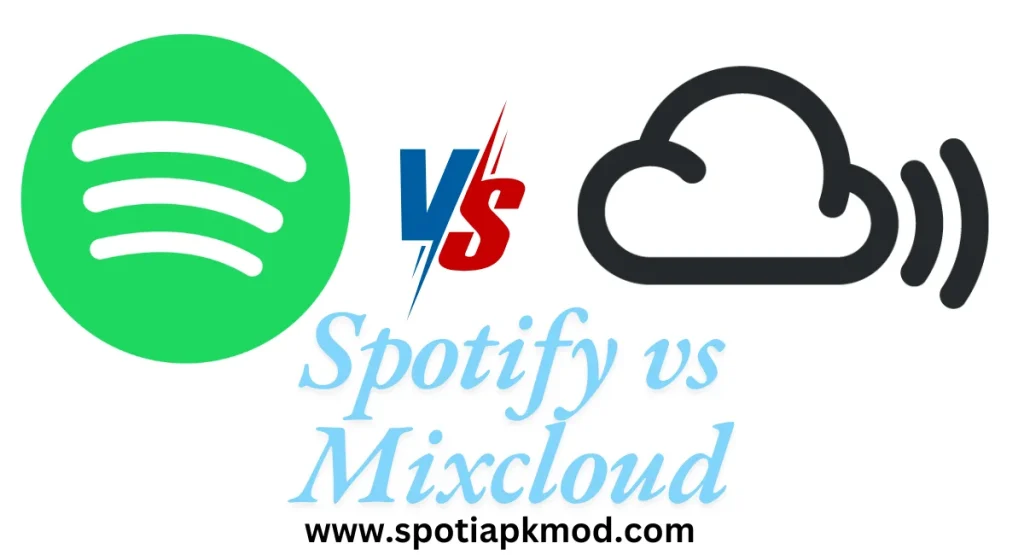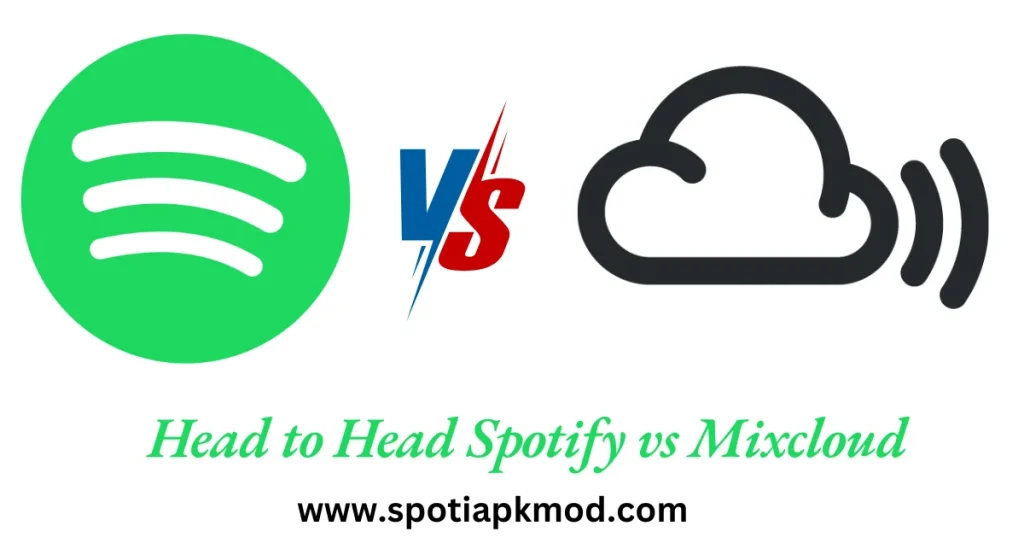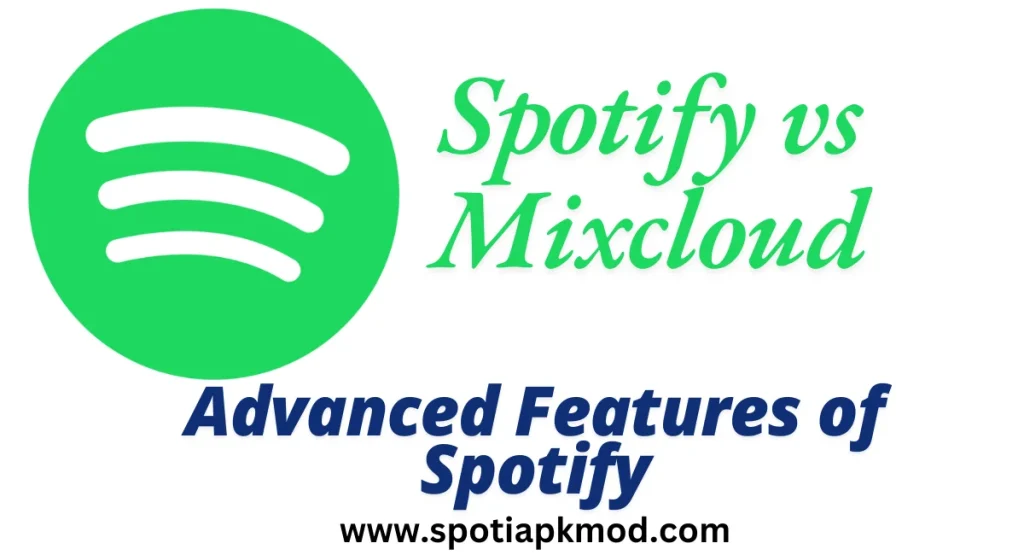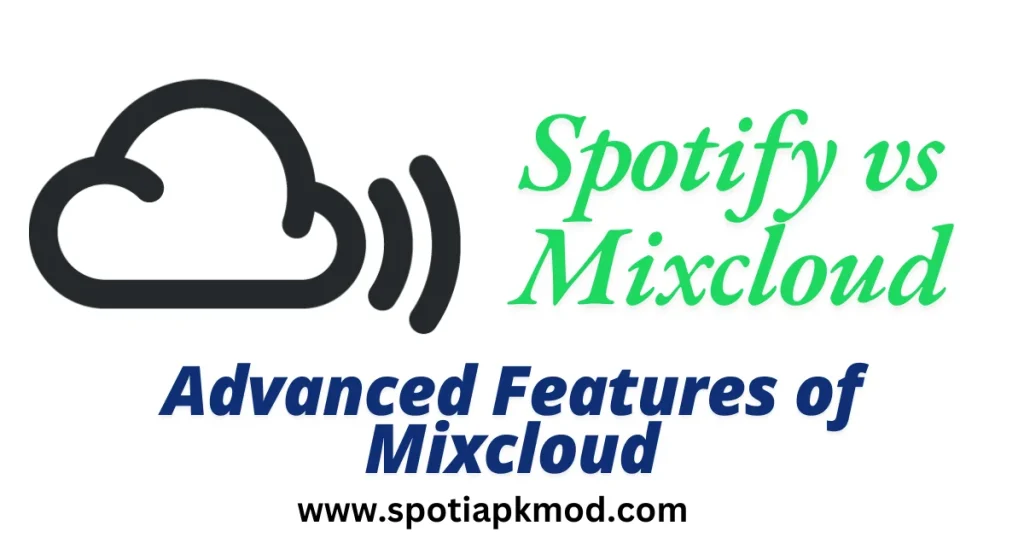Two Titans of Music Streaming: Spotify vs. Mixcloud
Spotify and Mixcloud occupy different niches in the music streaming world.
Spotify: It is well known for its mainstream music content that contains a wide array of albums and well-curated playlists. It leverages personalized recommendations and provides subscription as well as ad-supported options to its users. Although it enables the discovery of the latest music jams, it has been in the limelight for failing to pay deserving royalties to artists.
Mixcloud: It has user-generated content at the center, as is the case with mixes, radio shows, and podcasts. It introduces mostly the non-mainstream and independent music. Its model is working through a monetization system and a subscription service for listeners. The site is mostly aimed at people who are interested in underground and independent music scenes. Download Spotify APK Latest Version

Introduction of Spotify and MixCloud
Here’s a simpler version of the comparison between Spotify and Mixcloud:
Spotify, which was set up in 2006, was initially based in Sweden that allowed the users to hear music, podcasts, and other sound recordings. Letting the user listen to over 640 million, with 252 million paying subscribers, this app has ever been attracting the attention of its target audience. Functionality includes the choice of free (with ads) and premium versions as well as tune signing through the computer, smart phone, and smart speaker. Subscribers can discover music through either the name of an artist, an album, or the genre and they have the opportunities of creating and sharing playlists.
Mixcloud made its first steps more than 10 years ago, being a British recording company, and quickly picked up its main interest in long verbal content that is presented as DJ mixes, radio shows, and podcasts. As well as a DJS, radios, and labels that prefer to distribute their content through Mixcloud, it is very popular. Mixcloud my also offering the product free or at a price and it managed to attract as much as $11.5 million worth of fundraising.
Summary: Spotify has earned a high reputation for being a home to a huge number of tracks and for being user-friendly music player which made it the favorite one of the audience. As regards Mixcloud, the app is suitable for longer audio content and is on the curated audio segment that is in high demand of creators and fans.
Read More: Spotify Vs Joox
Head to Head Spotify Vs. Mixcloud

Content Library
Spotify: Spotify boasts a huge library of over 70 million songs, covering everything from popular hits to niche genres. It also includes podcasts, audiobooks, and exclusive content, with new releases being added regularly.
SoundCloud: SoundCloud is known for its focus on independent and underground music. Many artists upload their demos, remixes, and experimental tracks here, making it a great place to discover new and lesser-known music.
Music Discovery
Spotify: Spotify uses algorithms to guide music, offering personalized playlists like “Discover Weekly” and “Release Radar” based on your listening habits. This helps you find songs that match your tastes easily.
SoundCloud: SoundCloud enables a more community-driven approach to music discovery. You can follow artists, like tracks, comment on specific parts of songs, and explore experimental content, making it easier to find underground talent.
Monetization
Spotify: Spotify pays artists through streaming royalties, but the pay-per-stream rate is often low, especially for smaller artists. To earn a decent income, artists usually need millions of streams, and the payments are shared among Spotify, labels, and artists.
SoundCloud: SoundCloud offers several monetization options, like ad revenue sharing through SoundCloud Premier and SoundCloud Pro. This allows creators to earn money more directly from their tracks, making it appealing for independent artists.
Free and Premium Features
Spotify: Spotify presents both a free version with ads and a Premium subscription. The free version has limitations, like fewer skips and no offline listening. Premium users enjoy ad-free listening, better audio quality, and offline access.
SoundCloud: SoundCloud also has a free version with ads, but its premium plans—SoundCloud Go and Go+—remove ads and add features like offline listening and access to more music. The Go+ plan provides full access to SoundCloud’s catalog.
Audio Quality
Spotify: Spotify’s Premium users can stream music at a maximum quality of 320 kbps, which is considered high-quality and works well with good headphones or speakers.
SoundCloud: SoundCloud streams at a maximum of 256 kbps for free users, but Go users can enjoy higher quality. While decent, it might not match Spotify’s premium quality for audiophiles.
Music Formats
Spotify: Spotify only supports officially licensed music and podcasts, meaning you mostly get tracks from major labels and verified artists.
SoundCloud: SoundCloud allows various content types, including remixes, live DJ sets, and demos. Artists can upload everything from full tracks to short clips, making it a flexible platform for different audio formats.
Podcast Support
Spotify: Spotify has heavily invested in podcasts, featuring a wide selection across various genres and offering tailored recommendations and features like playback speed controls.
SoundCloud: While SoundCloud supports podcasts, it’s not as focused on this format as Spotify. Most podcasts on SoundCloud are from independent creators, offering niche content that might not be on Spotify.
Audio Licensing
Spotify: Spotify works under strict licensing agreements, meaning most content is officially licensed. This ensures high-quality, legal tracks but limits some independent or user-generated content.
SoundCloud: SoundCloud allows a wider range of user-uploaded content, including tracks that may not be traditionally licensed. This leads to a more diverse catalog, though some tracks might be removed due to copyright issues.
Target Audience
Spotify: Spotify aims at a wide audience, demanding music lovers of all genres, ages, and regions. Its focus on mainstream music and podcasts makes it right for both casual listeners and serious fans.
SoundCloud: SoundCloud attracts users who are interested in independent and experimental music. It’s a favorite for those who enjoy discovering emerging artists and unique remixes not commonly found elsewhere.
Social Features
Spotify: Spotify includes social features like playlist sharing and collective playlists. You can see what friends are listening to and share music, though its social features aren’t as integrated as some users might hope.
SoundCloud: SoundCloud has stronger social features, allowing users to follow creators, leave comments on tracks, repost songs, and create playlists that others can follow. This encourages more engagement with artists and tracks.
Visit More: Spotify Vs Sound Cloud , Spotify Vs Pandora
Advanced Features of Spotify

Offline Listening: With Spotify Premium, you can download your favorite songs, albums, and podcasts to enjoy without needing an internet connection. This is especially handy when you’re traveling or on the move.
High-Quality Audio: As a Spotify Premium subscriber, you can listen to music at higher bitrates, giving you a clearer and more enjoyable sound experience.
Sleep Timer: You can set a timer to stop the music after a certain period, which is great for those who like to drift off to music without it playing all night.
Social Sharing: Share your favorite tracks, playlists, and what you’re currently listening to on social media. Plus, you can follow your friends to see their lyrical tastes and offers.
Playlist Collaborations: Create shared playlists that your friends can add to and modify, making it simple to share and discover new music together.
Podcast Integration: Enjoy an extended selection of podcasts right within Spotify, with advice tailored to your listening habits. You can even create playlists that mix both music and podcasts.
Spotify Connect: This feature lets you control your music from any device. You can kick off a song on your phone and then effortlessly switch to your smart speaker or computer without any interruptions.
Group Session: Premium users can listen to the same music together in real time.
Behind the Lyrics: Get insights and background info about songs while you listen.
Spotify Running: Create playlists that match your running speed to make workouts more enjoyable.
Advanced Search Operators: Use specific keywords to find music by year, genre, and more.
Spotify Wrapped: At the end of each year, Spotify gives you a personalized recap of your listening habits, showcasing your most-played artists, songs, and genres.
Radio Stations: You can create custom radio stations based on any song, album, artist, or playlist. Spotify will then play similar music, helping you discover new favorites.
Advanced Features of Mixcloud

- High-Quality Audio: Designers can upload their mixes in high-quality audio formats, ensuring that listeners enjoy an improved sound experience that is crucial for music appreciation.
- Live Streaming: Allows developers to broadcast in real-time, fostering immediate interaction with fans while ensuring copyright protection for the music used in streams.
- Fan Support Options: Fans can financially support their favorite creators through tips or subscription models, helping artists monetize their work and build a loyal community.
- Feedback Tool: Creators can receive direct feedback from listeners, allowing them to improve their mixes and adapt to audience preferences, fostering a more engaged community.
- Society Arrangement: Mixcloud promotes interaction between fans and creators, allowing listeners to share their favorite mixes and participate in discussions, enhancing the overall experience.
- Copyright Protection: Mixcloud provides full copyright protection for creators, ensuring that their mixes are safe from takedowns and allowing them to share their work freely.
- Customizable Profile: Creators can personalize their profiles with images, bios, and links to social media, helping them build their brand and connect with fans more effectively.
- Joint Features: Mixcloud allows for collaboration between creators, enabling them to work together on mixes or projects, which can help expand their reach and audience.
- Mobile App: The Mixcloud mobile app provides a seamless listening experience on the go, allowing users to access their favorite mixes and discover new content anytime, anywhere.
- Social Tools: Creators can easily share their mixes on social media platforms, increasing visibility and driving traffic back to their Mixcloud profiles.
- Creator Dashboard: A complete interface for managing uploads, tracking performance metrics, and understanding audience engagement, allowing creators to optimize their content strategy effectively.
- Unregistered Streams: This feature enables creators to share only mixes with a select audience without making them publicly available, perfect for private events or partnerships.
- Playlist Creation: Creators can curate playlists that showcase their favorite tracks or mixes, allowing for thematic inquiry and enhancing listener engagement.
- Analytics and Insights: Complex analytics tools help creators understand their audience better by providing data on listener demographics, employment rates, and mix performance over time.
| Feature / Platform | Spotify | Mixcloud |
|---|---|---|
| 1. Mainstream Music | ✓ | 𐄂 |
| 2. DJ Mixes/Radio Shows | 𐄂 | ✓ |
| 3. Podcasts | ✓ | ✓ |
| 4. Artist Compensation | 𐄂 | ✓ |
| 5. Audio Quality | ✓ | ✓ |
| 6. Monetization Options | 𐄂 | ✓ |
| 7. Social Features | ✓ | ✓ |
| 8. Content Diversity | 𐄂 | ✓ |
| 9. Community Engagement | 𐄂 | ✓ |
| 10. Legal/Copyright Issues | ✓ | ✓ |
Conclusion
Choosing between Spotify and Mixcloud always comes down to what you like in a music streaming service.
Spotify has an edge if you find an enormous collection of mainstream music, podcasts, and the ability to personalize your listening experience comforting. However, it is also quite popular for the way it pays artists, especially to small and lesser-known ones.
Mixcloud is the place to be for the ones who like DJ mixes, radio shows, and independent podcasts. It does that by helping the creators to earn money directly from fans, thereby, achieving a community that is all about the creation and exploration of art.
If you like mainstream music and are a lazy user, you can choose Spotify. If you are a type of person who is keen to investigate diverse musical content made by independent artists and others, then, Mixcloud suits you best.
Frequently Asked Questions
What types of music can I find on Spotify and Mixcloud?
Spotify: A wide range of popular music from major labels and artists.
Mixcloud: DJ mixes, radio shows, podcasts, and niche music content.
What is the audio quality like?
Spotify: Premium users can stream up to 320 kbps.
Mixcloud: Supports high-quality audio uploads for DJs and creators.
Are there social features on these platforms?
Spotify: Basic features like playlist sharing and seeing friends’ listening habits.
Mixcloud: Stronger community engagement with comments and artist interactions.
How do they take copyright issues?
Spotify: Highlights licensed content to avoid copyright problems.
Mixcloud: Allows DJs to share mixes without the risk of takedowns.
Can I find radio shows and live sets?
Spotify: More focused on music and podcasts.
Mixcloud: Offers a wide range of radio shows and live DJ sets.